
The past seven years have seen an explosion in both music and music journalism. Everyone now races for a daily fix of the new at a pace that would have been unimaginable even a decade ago. At its best, paradigms are shifting and power is moving into the hands of the many. At its worst, music culture is now more disposable than ever, with people fixated on the Next Big Thing like a pack of hyenas closing in on wounded prey. Tabloid times these certainly are, and not even our beloved tunes have escaped.
We here at The DeLorean have only one way to respond: bah, humbug! There’s no need to rush our way through record after record on an hourly basis. It’s okay to take days, months, and even years to absorb a band’s work. Music doesn’t need to be consumed like a fashionable commodity operating on a 12-month buying cycle. The latest is rarely the greatest, and the old do not have to make way for the new.
So, why don’t you take some time out of your day, make a cup of tea, and sit back to ponder our DeLorean Discoveries: a collection of great records from the past that we happened to stumble upon in 2007. We hope you enjoy.
-Charles Ubaghs, DeLorean editor
——
——
—— Blueboy
Blueboy
Unisex
[Sarah; 1994]
by Jay
There’s something voyeuristic I enjoy about surrounding myself with music that could only have existed in a precise musical climate, particularly one that I barely missed out on. This year marked my first real introduction to Sarah Records, and nothing gave me what I didn’t know I was looking for more than Blueboy’s Unisex. Under different circumstances I could imagine positively hating it, but this of course is frequently what makes an album so damn affecting. I found myself incredulous at what I was hearing — the audacity of its sentiment, but also its genuine musicianship. You’re forced to forgive it so many indulgences: the melodramatic opening strings of “So Catch Him,” the saccharine instrumental “Also Ran,” titling a song “Imipramine,” and delivering lyrics like “I am young and quite pretty/ Don’t hurt me” (“Marble Arch”), “I like sex at my own pace”, and “Take me out to the bright lights/ I wanna walk cute down the streets of SoHo” (“Self Portrait”) — they’re the kind of things typically more comfortably seated in protective, apologetic lo-fi, but the brilliant sheen of Unisex’s production, celestially drenched in reverb, coupled with the proficiency of its performances, exposes a naked sincerity. And for that, it becomes the most vulnerable record I’ve ever heard.
——
——
—— Win
Win
Freaky Trigger
[Virgin; 1989]
by David Nadelle
Poor Davey Henderson. Some people are destined to be cast in life’s role as the “almost man.” Although others have spent more time squinting from the spotlight glare, Henderson has unassumingly emerged as one of the legends of Scottish pop music. First with the groundbreaking Fire Engines, then with the occasionally brilliant Nectarine No. 9, Henderson has carved out a career light on mainstream attention but heavy on influence. Between these two acts, Henderson was the main man in Win, an addictive, funky pop band that took in everything from up-to-the-minute electropop to Bolan Boogie to 1960s sweet soul to “Antmusic.” After receiving some notoriety in their native Scotland after McEwan’s Lager used the group’s “You’ve Got the Power” for one of their commercials, Win put out their second album, Freaky Trigger. As catchy as anything off of Annie’s Anniemal (so, pretty fucking catchy in other words) and lauded by critics, the album was, of course, ignored by the public. Those of you who have not heard Win might not think the quest to find Freaky Trigger worth your trouble. Those who have heard the perfectness of “What’ll You Do ‘Til Sunday Baby, “Dusty Heartfelt,” and “What’s Love If You Can Kill For Chocolate” would spit upon you for contemplating not tracking it down.
——
——
—— Sandy Bull
Sandy Bull
Fantasias for Guitar and Banjo
[Vanguard; 1963]
by Jspicer
Sandy Bull plays guitar as if he were possessed by the beast that bears his name—he carefully observes his prey, slowly dances around it in a circular motion, and then begins the relentless assault until nothing is left standing. Bull was a rare blend of jazz and folk, creating meditations on classic ragas and traditional anthems. Battles with drugs began to obscure his musical focus, but those problems will never dampen the virtuosity of his debut Fantasias for Guitar and Banjo, which blended classical tunes with [at the time] modern progressions and experimentation by mixing in world music influences rarely heard in the Western Hemisphere. It’s those explorations that still make Bull’s debut fresh no matter how avant music becomes.
——
——
—— The Incredible String Band
The Incredible String Band
The 5000 Spirits or the Layers of the Onion
[Elektra; 1967]
by Chizzly St. Claw
On the heels of their debut, The Incredible String Band probably made a subconscious decision to release a record that would make their appellation that much more appropos. The original trio was reduced to two — Robin Williamson playing seven separate instruments including oud and gimbri, and Mike Heron on guitar and harmonica. They added Licorice on vocals, Danny Thompson on double bass, John Hopkins on piano, and even brought in Soma for some sitar work. What resulted was nothing less than a varied, but mainly folk-styled, masterpiece that swings on heavenly vines between lullabies of child-like wonder, seemingly somber laments, and rollicking hay bounces. Flowers in your hair, toke-a-dope, and spike your day with a little whimsy. If you’re not too tough, you too can sing along to songs about fluffy clouds, happy hedgehogs, and magic Christmas trees. 5000 Spirits wastes no time revealing what really makes today’s psych-rock and freak folk roots run green like onion grass. For someone looking for a more head-smushing power-trip, acid-daze kind of psych-folk, you might be a little disappointed when your stereo muse sings what might be misconstrued as children’s songs. Oh, contraire mon freire, this album is a visual and relevant reminder that good music can be beautiful and fun.
——
——
——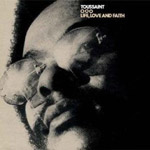 Allen Toussaint
Allen Toussaint
Life, Love and Faith
[Reprise; 1972]
by Jason P. Woodbury
While Marvin Gaye may have tackled similar themes with prettier orchestration, loftier arrangements and a smoother croon only a year earlier with What’s Going On, New Orleans native Allen Toussaint’s 1972 Life, Love and Faith gave voice to social tension, spiritual yearning and romantic frustration with a grit Gaye’s classic lacks. Toussaint’s bullfrog voice isn’t exactly the sweetest thing, but it works wonders paired with the sheets of fuzz guitar, melodic bass and New Orleans style horns that bash about all over the album. Whether he’s tackling smooth soul or solid funk, Toussaint sounds like he’s reaching, in all the best ways, and that ambition drives the album to the end. While it may not be Toussaint’s definitive statement, its veering eclecticism most accurately displays the man’s far reaching talent and skill.
——
——
——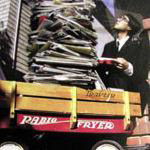 Mike Relm
Mike Relm
Radio Fryer
[Self-Released; 2005]
by Chris Gliddon
To be perfectly honest, I have no idea what rock I had my head under to not have heard of Mike Relm before this year. The San Francisco-based DJ’s set at Coachella was nothing short of jaw-dropping, and far more intriguing than any Girl Talk set would ever be for me. Relm (aka Michael Wong) is simultaneously quick-handed, calm and remarkably witty, all without falling into the boring “mashup” trap. Is Radio Fryer another mashup album? Sure, but let’s face it, very few others have assembled a mix record this enjoyable. You haven’t lived until you’ve arrived at the moment when “Little Girls” lands half-way through this immaculate pile of shit. Cheers, Mike.
——
——
—— Baby Grandmother
Baby Grandmother
Baby Grandmother
[Subliminal Sounds; 2007]
by Mangoon
If you’re like me, you’ve spent numerous stoned hours zoning out to the heavy psych stylings of early ‘70s Swedish acts like Parson Sound, International Harvester, Algarnas Tradgard and the almighty Trad Gras Och Stenar. Perhaps, in your reverie, you have wondered how it all came to be. Or perhaps you’ve been so zonked, you haven’t really gave a damn. Either way, I will enlighten you. The Grandmothers were forged from the ashes of one of Stockholm’s most famous R&B styled beat bands, the T-Boones, who in 1967 recorded the single “I Want You”, which critics agree is Sweden’s first heavy rock record. By this time, the T-Boones were down to a three piece, and the heavy blues sounds of Hendrix and Floyd had begun to drift to their Nordic home. The T-Boones became the Baby Grandmothers in early 1968 and started improvising heavier, longer, more modal pieces, bearing similarities to Floyd’s lengthier live workouts of Astronomy Domine and Grateful Dead’s’ The Eleven but with that smoked-out crunch and burn only heard from that seminal Stockholm era. The Grandmother’s all night love-ins at the infamous Club Filips set the scene for all those other bands to evolve. Today, that musical chapter has a cultish legacy and has proved quite influential to current acts like Acid Mother’s Temple (who have recently performed on stage with Trad Gras) and fellow Swedes Dungen, of whom guitarist Reine Fiske put together this repress, copiously adorned with extensive liner notes that assure this baby doesn’t get cast down the memory hole once again.
——
——
—— Grandaddy
Grandaddy
The Sophtware Slump
[V2; 2000]
by David Harris
A few years back, I worked a really shitty job writing for a magazine about ophthalmology. One of my co-workers wrote part-time for Rockpile and considered himself quite the aficionado of the indie scene. One morning, he intercepted me on the way to the coffee truck to play me “the best Radiohead track” I’ve never heard. Too bad it was Grandaddy’s “So You’ll Aim Toward the Sky,” the final song from The Sophtware Slump. To the less discerning ear, it could be easy to confuse Jason Lytle’s tenor for Thom Yorke’s. But Grandaddy and Radiohead are worlds apart. While Yorke keeps the listener at arm’s length with ironic songs fraught with paranoia, Lytle’s lyrics are warm and inviting, tinged with hints of sadness. When Lytle examines the downfall of the dot-coms in “He’s Simple, He’s Dumb, He’s the Pilot,” he looks at the suited hordes not with sardonic humor but genuine concern for their future. He even humanizes an android on the gentle track “Jed the Humanoid.” Though it will never be regarded like OK Computer, The Sophtware Slump is another masterpiece about technology replacing humanity. It is a beautiful album, saturated with gorgeous melodies, impeccable production and an overwhelming bittersweet sadness. Grandaddy broke up last year after 14 years, leaving behind five albums and a plethora of great songs. The Sophtware Slump just may be the defining statement of Lytle’s “2000 Man,” the dot-comer who thought he had it all — and like silicon, it crumbled away between his fingers.
——
——
—— Judy Nylon
Judy Nylon
Pal Judy
[On-U Sound; 1982]
by John Jolley
Dub producer and remixer Adrian Sherwood (Lee Perry, etc.) is behind the decks on this cyberpunk nightmare; balanced by equal amounts of new wave and no wave, fronted by glam punk icon Judy Nylon of Snatch, there’s much to be said about this LP (it’s yet to have been reissued), and most of it’s already been said, so rather than rehash her association with Brian Eno or !!!’s obsession with this record, I’m going to simply insist you get it any way you can. Alternatively tinny and spaceous, Pal Judy is like a bad dream or a hallucination; despite the ancient technology being used, the beats and melodies shift and spin underneath the vocals in untraceable patterns and cycles, alternatively disorienting and soothing. Think of a William Burroughs piece read by Scarlett Johansson. Viva 1982!
——
——
—— Jimmy Cliff and Various Artists
Jimmy Cliff and Various Artists
The Harder They Come
[Mango; 1972]
by Buckner
The best and worst thing about being a music fan is that you’re never done exploring. You consume, consume, and consume, and you don’t reach any endpoint. Given these circumstances, I might never have reached The Harder They Come, an album I’d always wanted to check out. Partly because of my aversion to reggae (and partly overexposure to Bob Marley’s ubiquitous Legend), I put it off. Then I saw Jimmy Cliff perform this record’s title track on an old episode of Saturday Night Live, and I was dumbfounded. It was beautiful, soulful, and charmingly ramshackle - all things missing from most reggae I’d heard. The record, a soundtrack to the 1972 film of the same name, is staggeringly brilliant. Cliff’s patient, organ-driven version of “Many Rivers To Cross” is nothing short of breathtaking; the rest of the highlights are now reggae classics, such as The Slickers’ “Johnny Too Bad” and the Melodians’ “Rivers Of Babylon.” In my mind, these tracks have more in common with Stax than Bob Marley, sonically speaking. Whereas Marley – whom I dumbly took to represent all of reggae, and an unquestionably great songwriter with inarguable influence – leaves me strangely cold, these performances have the same warm showmanship as an Otis Redding cut. I can only hope this is the gateway drug. Marley, you’re next.
——
——
—— The Sweet Things
The Sweet Things
Lo-Fi is a 4-Letter Word
[Cut-Out; 1998]
by Joe B.
There are a bunch of things I want to write about The Sweet Things that will make me look like an idiot. I genuinely think this album deserves a place in some shaggy-haired pantheon next to the rawer offerings of Pavement, Half Japanese, Swell Maps or at least Thinking Fellers. I am a frothing madman over this album, so I feel like I should demand my comments not be taken with a grain of salt. It’s tough to articulate this album’s genius because it isn’t particularly provocative or innovative; it’s just really, really good. In a way, it came as a huge breath of fresh air. Every time I’m worried my sensibility is getting too esoteric or weird, a record like this comes along, hands me a beer and reminds me that volume, simplicity and fun are king. At no point during Lo-Fi does it sound like the Sweet Things aren’t having the time of their lives. They were, I assume, a bunch of friends writing songs about and for their other friends. Perfect.
——
——
—— Bruce Springsteen
Bruce Springsteen
The Wild, The Innocent & The E Street Shuffle
[Columbia; 1973]
by Jason P. Woodbury
1972’s The Wild, the Innocent and the E Street Shuffle finds the Boss in sophomore mode, anxious to shed the “New Dylan” tag by, well, trying to be the new Van Morrison or something. The Wild, the Innocent… finds Springsteen gleefully trying on every hat he can grab, bouncing sonically from urban mystic incantations to frantic funk workouts, from guitar hero squeals to Latin influenced soul. The E Streeters were always an integrated band, but on this album the cultural meeting is deafeningly audible; this is street level world music. It’s not to say that Springsteen would never be this adventurous again (Nebraska was literally career suicide), this hungry (because The Wild, the Innocent…’s follow up, Born to Run had even more make or break effort), or even this celebratory (see the party on tape that is The Seeger Sessions) but The Wild, the Innocent and the E Street Shuffle is certainly the last time the Boss and crew were so ambitious, dangerous and risky.
——
——
—— Beulah
Beulah
Handsome Western States
[Elephant 6; 1997]
by Emceegreg
I couldn’t agree more with the title of Beulah’s 2003 final tour DVD, A Good Band is Easy to Kill. It was Apple in Stereo’s Rob Schneider who helped make Handsome Western States the only release the band had on Elephant 6. But, my god, HWS was Elephant 6. It was a missing puzzle piece that managed to brilliantly balance out the bizarre flavors of The Oliver Tremor Control and Neutral Milk Hotel. The similar instrumentation of NMH sneaks in at times, like on “I Love John, She Loves Paul”, but feels original on its own. Lead singer Miles Kurosky’s playful lyrics are also sarcastic and irreverent to a then growing “indie culture”. I feel about HWS as I do for Spoon’s Telephono as it does more than just accomplish what it sets out to do, and is also a youthful gem. Few albums, like this, fully come to life and give off such an effervescent energy that is as exhausting as it addictive. The feel of the album is summed up on “Rust With Me” when Kurosky is as nihilistic as he can get with, “Gotta song/ It’s prettier than your girlfriend/ I gotta song/ Yeah, it’s cooler than you.”
——
——
——
 Gas
Gas
Pop
[Mille Plateaux; 2000]
by LarryFitzmaurice
Let’s face it: nothing is truly original. Every musician always has a reference point, no matter how much they re-write tonal language. When Axel Willner (nee The Field) dropped the hypnotic, crushingly classic From Here We Go Sublime earlier this year, it may have seemed that he was re-writing the electronic playbook; even he was willing to admit in interviews that Gas did it first. Kompakt co-founder Wolfgang Voigt, under the elemental pseudonym, pushed true naturalistic beauty to blissful limits with his 2000 masterwork, Pop. Don’t let the title of the record fool you into believing that this is an immediate affair- Voigt seems more concerned with the building of tension where the onomatopoeic connotations of pop never fully emerge. Rushing water continually falls, frequencies sing ambient lullabies to the electric forests, and occasionally 4/4 beats come in like bulldozers to the rainforest- call it a postmodern Walden, where natural immersion is more synthetic than you could possibly imagine.
——
——
—— Ewan MacColl
Ewan MacColl
Black and White: The Definitive Ewan MacColl Collection
[Cooking Vinyl; 1991]
by Jeff Roesgen
Over the years, folk musicians have diverged into two main schools: those who play folk music and those who become it. British musician, writer, and actor Ewan MacColl occupies this latter realm with few others. Both his own lyrics and those he interpreted from traditional works, lie on the same cultural continuum: voices from Northern Britain. He re-summons medieval recruitment gangs (“The Press Gang”), he recounts old Highlander battle musters (“Highland Muster Roll”), he recalls the industrial slum where he spent his boyhood (“Dirty Old Town”), and constructs an ode to a principled workingman (“My Old Man”). He steps beyond North Britain as “Black and White” chronicles the South African tragedy at Sharpeville, and “Brother Did You Weep” protests the Vietnam war. Also included is MacColl’s definitive and perhaps iconic love song, “The First Time Ever I Saw Your Face.” The instrumentation accompanying MacColl is predominantly simple with gentle acoustic guitars and slightly ornate banjo pickings, both yielding nearly all emphasis to the words. And indeed the most affecting moments of this compilation happen when MaColl sings unaccompanied: a tuneful holler with perfect, rusted diction. This collection of work was compiled posthumously by MacColl’s family in 1990, a year after his death. It was unique among the older records that I discovered this year: a year that saw such overwhelming public discourse in the future of politics, economics, religion, the environment. It was enchanting to encounter music this relevant and vital and linked so dearly with the past.
——
——
—— Tyrannosaurus Rex
Tyrannosaurus Rex
Prophets, Seers & Sages – The Angles of The Ages
[A&M; 1968]
by Hanky Panky
Before their full commitment to glam rock, before their indulgence in Tolkienian lyricism, before even the questionable contributions of Mickey Finn, there was Prophets, Seers & Sages – The Angles of The Ages. Fraught with intense bongo action, this psychedelic-folk album was the second release by Tyrannosaurus Rex (not yet T. Rex) as headed by Marc Bolan, and is key to understanding any album that touts itself today as “New Weird America.” Featuring the strong backing vocals by Steve Tool before Bolan kicked him to the curb for being a wily, freewheelin’ anarchist, Prophets’ lyrics vary from the nonsensical, “She headed deep in chartreuse/ a falcon glimpse of white teeth/ separated by lace cinnamon folds,” of Wind Quartet, to the energetic chorus of Traveling Tradition consisting of “boom de boom, de tra la la/ trat trat trat trat, de boom de boom.” Beyond all this, Prophets, nearly four decades after its initial release, remains a timeless album for everyone- my mother loved it in junior high, I loved it in college, and today in primary school, my sister can’t get enough, ensuring it a long life for many generations to come.
——
——
——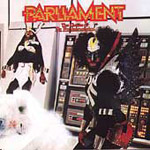 Parliament
Parliament
The Clones of Dr. Funkenstein
[Casablanca; 1976]
by Papaya
I’ve been promising Ubaghs a review of this album for the better part of a year now, yet somehow it seems that every time I sit down to write the article I get about as far as “5/5” and then spend the rest of the album playing air drums in a state of utter bliss. Some might call it shoddy journalism, but I call it the only reaction one could reasonably expect when the album in question is a monster like Funkenstein. The light-speed imagination of the band is apparent before the needle even hits, as proven by the futuristically flamboyant album artwork, and confirmed by “Prelude”’s opening proclamation that “funk is its own reward.” Parliament begin backing that statement up in the next track, “Gamin’ on Ya,” and never look back. The album hinges on the story of Dr. Funkenstein but makes room for platform-tappers like “Getting to Know You.” And what Bootsy Collins make out tape would be complete without “I’ve Been Watching You?” All the funk of Mothership Connection without the “hit single” factor, The Clones of Dr. Funkenstein comes straight out of a Parliament on top of their game.
——
——
——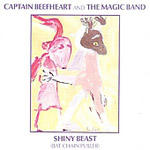 Captain Beefheart
Captain Beefheart
Shiny Beast (Bat Chain Puller)
[EMI; 1978]
By MDillon
I have been a fan of Captain Beefheart for a long time, but when my dad was showing me Zappa records, Mr.Beef fell by the wayside. It wasn’t till I got older that I realized Beefheart was better, weirder and more complex than most of his peers. The thing about Shiny Beast was that it has vaudevillian ragtime stylings like “Harry Irene”, weird (creepy?) party jams like Tropical Hot Dog Night (one of my favorite songs of this year) and She Makes You Feel Like a Man, which makes me want to start chain smoking immediately. Beefheart forever mofuggas, Beef Out.
——
——
——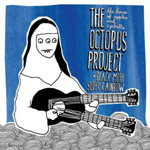 Black Moth Super Rainbow + The Octopus Project
Black Moth Super Rainbow + The Octopus Project
The House of Apples & Eyeballs
[Graveface; 2006]
by Path
Having been turned on to the googley-eyed cartoon show of BMSR’s Dandelion Gum this year, I tracked down this collaboration with The Octopus Project from last year, which in turn turned me on to the blipperifficiness of OP. The two bands’ aesthetics overlap so well they combine to form a sound arguably stronger than either on their own. This swift little album is densely packed with moments of burbling brilliance. Tracks like “Psychic Swelling” and “Beds” stand among organic electronic’s best, in almost completely different ways as well. Synth rubs ooze all over gallolloping beats. Gentle thumps prop up whispethereal melodies. Even on the songs that sound like they’ve been stuffed to the point of bulging with sonic bric-a-brac, every squirt and thwack serves a purpose. The nonsensey titles are par for the playful nature of these bands, but this team effort uncovers the underlying sagaciousness that keeps both Black Moth Super Rainbow’s and The Octopus Project’s music compelling long after the novelty of bloopy noises sinks in.
——
——
——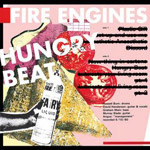 Fire Engines
Fire Engines
Hungry Beat
[Acute; 2007]
by Todd Kroviak
I’ll be damned if post-punk hasn’t been beaten to death in the past six years. You would think that after the fashionable abomination of bands like The Rapture and Franz Ferdinand, everything worthwhile from 1978-1983 would have been played-out by now. But alas, there are still gems to be unearthed, which is perfectly exemplified by Hungry Beat. The Fire Engines may be high on Alex Kapranos’ list of bands to blow, but fuck that guy—this is still uncharted territory for most of us. Even though this isn’t the first comp to offer the band’s material on CD, anybody (namely, me) who felt that Domino did a piss-poor job with their 2005 reissue Codex Teenage Premonition has been awaiting the day when all of their studio works were properly assembled. The Fire Engines existed from ‘79 to ‘81 and bridged the gap between two disparate concepts—pop smarts and grating noise. If it sounds like a mess, that’s because it is. However, it also happens to be some of the most vital and bizarrely uplifting music of the era. The band used no cymbals in their percussion, no chords in their guitar work, and no fluidity in their basslines, sounding like Captain Beefheart and James Chance jamming with a bunch of eight-year-old kids jacked up on Red Bull and Pixie Sticks. Somehow the songs still manage to hang together, clattering their way into your heart as Hungry Beat is simultaneously shambolic, giddy, contemptuous, lopsided, and incessant. Needless to say, I fucking adore it.
——
——
—— Kevin Ayers
Kevin Ayers
Joy of a Toy
[Harvest; 1969]
by David Nadelle
2007 was the year I discovered Kevin Ayers for the second time. After previously spending some intense months digesting the Soft Machine discography, it was time to add some solo Ayers to my diet. Nearing the end of the 1960s, Ayers exited The Soft Machine and scuttled away to Ibiza to begin a creative fling that resulted in a four-album ride rarely touched by other songwriters, and certainly not by any other amiable, wine-swilling beach hobo. Joy of a Toy was the first of these albums. From the instrumental street fayre fun of “Joy of a Toy Continued” to the campfire singalong “All This Crazy Gift of Time,” it is clear that the Spanish sun had a significant inspirational lift on the then-exhausted Ayers. In between these album-ends, we are treated to Syd Barrett-esque gems (“The Clarietta Rag”), creepy classics (“Lady Rachel”), Desire-era Dylan movers (“Stop This Train [Again Doing It]”), berserk Malaysian-styled memories from his childhood (“Oleh Oleh Bandu Bandong”), a couple of gorgeous ballads, a cornucopia of instruments (some played by his ex-bandmates in The Soft Machine), peculiar lyrics aplenty, and Ayers’ lovely baritone (sounding at times like Leonard Cohen with a Canterbury accent). All of Ayers’ albums are worth investigating, but Joy of a Toy is pure joy.
——
——
—— Dinosaur Jr.
Dinosaur Jr.
Bug
[SST; 1988]
by Ryan Sherwood
This past June I was lucky enough to catch one of Dinosaur’s (free!) reunion shows in Cambridge, and a rousing encore of “Freak Scene” motivated me to revisit the album I had long ago discarded as uninspired and largely hookless. And, to be sure, my first impression was not unfair. Bug is the sound of a band ripping itself apart, of two vicious, unripe egos locked in a fight to the death; bassist Lou Barlow would be gone in a matter of months (For the gory details, read Chapter 10 of Michael Azerrad’s amazing book, Our Band Could Be Your Life: Scenes From The American Indie Underground 1981-1991). But if Bug lacks cohesive songwriting, it makes up for it with J. Mascis’ solos and the band’s warm gallows humor - “Don’t” is just excruciating feedback and Barlow screaming “WHY DON’T YOU LIKE ME!?”. And there are a few great songs here too, especially “Budge” and, of course, “Freak Scene,” probably the best thing they ever wrote, which paints Mascis and Barlow as a kind of Harry and Sally, a match made in heaven who, for whatever reason, just can’t see how in love they really are. But, keep in mind, it had a happy ending.
——
——
—— Sleeping States
Sleeping States
Distances Are Great
[Kontra-Punkte; 2004]
by Elzee
Hopefully you’re not creeping around stalking me on last.fm, but if you are, you’ll only see me listening to this album after 11 PM, and you’ll see me listening to it a lot. A glanced-over collection of early releases, it has precisely the right balance of sound and silence to encourage insomnia - oddly arresting for songs consisting of barely audible guitar plucks and unidentifiable noises. Describing it as minimalist is an understatement. These compositions don’t go anywhere in particular, but the absent structure is appropriate. Vocals, when present, are tender without mucking up the music. Included is a sublime cover of Dionne Warwick’s “Don’t Make Me Over,” which translates surprisingly well to a sound that’s the polar opposite of R&B. It’s a shame Markland Starkie, the man behind Sleeping States, succumbed to releasing an indie rock Album (this year’s There the Open Spaces sounds like Coldplay without the bombast) as his project’s debut; Distances Are Great is better and, equally importantly, not an indie rock album. But I can’t imagine listening to this with other people. It’s something to cozy up to late at night with nothing but a cup of tea and your sweet self to keep you company.
(Click here to return to our 2007 year-end image map)